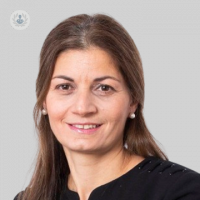Endometriosis and its diagnosis
Written by:Here to tell us all about endometriosis, its diagnosis and the challenges it presents, is leading consultant obstetrician and gynaecologist Ms Eleni Mavrides.

What is endometriosis?
Endometriosis is a chronic condition in which tissue similar to the lining of the uterus (endometrium) grows outside the uterus, commonly on the ovaries, fallopian tubes, and the tissue lining the pelvis. This tissue can cause inflammation, scarring, and pain, especially during menstruation.
What are the symptoms of endometriosis?
The symptoms of endometriosis can vary from person to person, but common symptoms include:
- Pelvic pain: This may range from mild to severe and can occur during menstruation, ovulation, or sexual intercourse.
- Heavy menstrual periods: Some individuals with endometriosis may experience heavy or irregular menstrual bleeding.
- Painful intercourse: Pain during or after sexual intercourse, known as dyspareunia, is a common symptom of endometriosis.
- Infertility: Endometriosis can affect fertility by causing inflammation and scarring that may block the fallopian tubes or interfere with ovulation.
How is endometriosis diagnosed?
Medical history and symptom assessment
Your doctor will begin by taking a detailed medical history and asking about your symptoms, including the location, severity and timing of any pelvic pain.
Physical examination
During a pelvic examination, your doctor may feel for abnormalities such as cysts or scar tissue in the pelvic area.
Imaging tests
Ultrasound: Transvaginal ultrasound may be performed to examine the pelvic organs and look for signs of endometriosis, such as ovarian cysts (endometriomas) or adhesions.
MRI: Magnetic resonance imaging (MRI) may be recommended in cases where endometriosis is suspected but not clearly visible on ultrasound.
Laparoscopy
Laparoscopy is the gold standard for diagnosing endometriosis. It is a minimally invasive surgical procedure in which a thin, flexible tube with a camera (laparoscope) is inserted through a small incision in the abdomen to directly visualise the pelvic organs.
During laparoscopy, your surgeon can visually identify endometrial implants, adhesions, and other abnormalities and may take tissue samples (biopsies) for further analysis.
Biopsy
If suspicious lesions are found during laparoscopy, your surgeon may perform a biopsy to confirm the diagnosis of endometriosis.
What are the challenges in diagnosing endometriosis?
Non-specific symptoms: The symptoms of endometriosis, such as pelvic pain and menstrual irregularities, can overlap with other conditions, making diagnosis challenging.
Delay in diagnosis: Many individuals with endometriosis experience a delay in diagnosis due to the normalisation of symptoms or the belief that menstrual pain is normal.
Limited imaging accuracy: While imaging tests such as ultrasound and MRI can provide valuable information, they may not always accurately detect endometriosis lesions, especially in early stages or in cases of deep infiltrating endometriosis.
Endometriosis is a common gynaecological condition that can cause significant pain and discomfort, as well as fertility problems in some cases. Diagnosis typically involves a combination of medical history, physical examination, imaging tests, laparoscopy, and biopsy. Early diagnosis and management are crucial for relieving symptoms, preserving fertility, and improving quality of life for individuals with endometriosis.
If you suspect you may have endometriosis or are experiencing symptoms suggestive of the condition, it’s important to consult a healthcare professional for evaluation and appropriate management.
Concerned about endometriosis? Arrange a consultation with Ms Mavrides via her Top Doctors profile.


